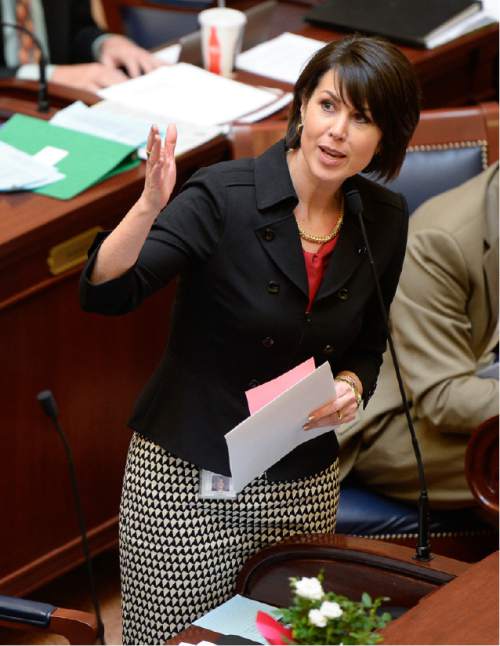This is an archived article that was published on sltrib.com in 2015, and information in the article may be outdated. It is provided only for personal research purposes and may not be reprinted.
Three leading national contact lens manufacturers are ganging up in federal court to try to prevent enforcement of new amendments to Utah law that they say are aimed at protecting Utah-based 1-800 Contacts at the expense of the U.S. Constitution.
Alcon Laboratories Inc., of Fort Worth, Texas; Bausch & Lomb Inc., of Bridgewater, N.J.; and Johnson & Johnson Vision Care Inc., of Jacksonville, Fla., are asking the U.S. District Court in Utah to stop state Attorney General Sean Reyes from enforcing SB169, which was signed last month by Gov. Gary Herbert.
In its lawsuit, Alcon said the passage of SB169 was under "the specter of protectionism" with 1-800 Contacts' officials offering testimony in support of the bill during its legislative passage. Bauch & Lomb, in a separate lawsuit, said the measure was "motivated by a parochial desire to protect a major in-state business at the expense of a targeted class of out-of-state corporations."
One legislator even referred to the measure as "the 1-800 bill," though House sponsor Rep. John Knotwell, R-Herriman, said during debate that it also was supported by other retailers, Utah manufacturers and online vendors, as well as Costco and Walgreens.
The lawsuits concern the three companies' pricing policies that were launched in 2013 and 2014 that set a minimum price for some of their products. The companies won't provide those products to retailers who sell below the price set by the companies.
Alcon says the policy is aimed, in part, at reducing lens sales in the "gray market" where resellers make sales not authorized by manufacturers directly to consumers, typically at a discount with no requirement of a valid prescription and without the assistance of eye-care professionals, according to its lawsuit. But it also is aimed at bolstering sales by optometrists, apparently at the expense of authorized resellers, like 1-800 Contacts, who are required to verify that prescriptions are current.
The policy, which includes other marketing provisions, also was needed to provide incentives to eye doctors to learn about the new lens and to, in turn, inform their patients about them, Alcon said.
Changes made by SB169, sponsored by state Sen. Deidre Henderson, R-Spanish Fork, prohibit a contact lens manufacturer or distributor from fixing or controlling a retailer's sales or advertised price to consumers.
It also says a manufacturer or retailer can't restrict its relationship with retailers based on whether they operate in a certain market segment or whether they are authorized by law to prescribe lenses, or are associated with someone who is.
Henderson said Tuesday that contact lenses require a brand-specific prescription that eye doctors can both prescribe and then sell to consumers.
"Because of this unique situation, consumers should absolutely be able to take their prescriptions and shop around for the best price," she said. "SB169 protects consumers and the free market by prohibiting contact lens manufacturers from engaging in their new predatory and anti-competitive pricing policies in the state of Utah."
The lawsuits, however, claim the amendments violate the Commerce Clause of the U.S. Constitution that prohibits states from enacting legislation that regulates business activities outside their borders or that favors in-state over out-of-state interests.
"By removing a company's right to set a unilateral pricing policy, the state of Utah has overstepped its bounds under the Constitution," Alcon spokeswoman Donna Lorenson said in a statement. "It has passed a law that controls activity out of state and interferes with programs and practices that benefit patients, eye care professionals and the marketplace for vision care products."
The amendments interfere with the companies' business operations around the country, not just in Utah, according to the lawsuits, which says Draper-based 1-800 Contacts sales are almost all to out-of-state consumers.
The Bausch & Lomb complaint calls SB169 "an extraordinary intrusion into interstate commerce" and a "clear violation of the Commerce Clause." Johnson & Johnson said the law is unconstitutional on its face.
The companies are asking the court to enjoin enforcement of the law before it goes into effect on May 12.
Attorney General spokeswoman Missy Larsen said only that the office was reviewing the complaints.
The lawsuits have been assigned to different federal judges but courts regularly consolidate similar cases under one judge.



